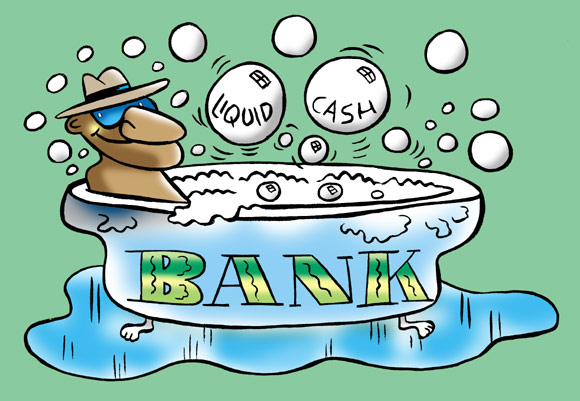
Understanding these seemingly difficult terms will help you navigate the complex world of personal banking with ease.
1. National Electronic Funds Transfer (NEFT)
Transfer of funds initiated by electronic means such as an electronic terminal, telephone, computer, or ATM. The NEFT facilitates the process of fund transfer within the same bank or inter-bank transfers. The minimum amount that can be transferred is as low as Rs 100.
2. Linked Account
Any account linked to another account in the same bank where funds can be transferred electronically between accounts and carry out other specified services as well.
Investmentyogi.com is a one-stop personal finance website which helps in managing finances, investments and taxes through services like financial planning, online tax filing, budgeting and 'Ask the Expert'.

3. Travellers' Cheque
Cheques issued by a bank and function as cash but are protected against loss or theft when travelling.
4. Base Rate
It is the minimum rate a bank charges its most credit worthy customer. The bank cannot lend below this rate (with an exception to banks employees, loans to bank's depositors against their own deposits, albeit with the subvention of the central bank).
For a retail customer, the Base Rate will cover all loans from auto, personal to home loans effective from July 1, 2010.

5. Balance Transfer
Balance transfer is an option included under credit card payments and is useful for persons holding more than one card. On availing this facility, the cardholder can transfer the balance amount outstanding on card one to card two and vice versa, if he/she is not able to make full payment that is due on a particular card.
In any case, the payment due date is only delayed but the payment has to be made at the scheduled time as stated in card two. Balance transfer facility is useful in reducing the interest outgo (on card one) and extending the payment due date on the original card.
6. Banking Ombudsman
Banking Ombudsman is an unbiased forum formed to resolve complaints registered by bank customers with respect to the services provided by banks. The RBI introduced this scheme under Section 35A of Banking Regulation Act, 1949. In case one has not been satisfactorily serviced by their bank, they should first register a complaint with the bank customer service department.
If they are not happy with the bank's response, then they can approach the banking ombudsman for an unbiased resolution.

7. Cashback
The term 'cashback' is used with reference to credit cards. Cashback means giving back some portion of money (spent by the cardholder through the credit card) to the cardholder himself. The cashback is made in terms of points earned; for example, the bank may say one point will be earned for every Rs 100 spent by the cardholder and at the end of the year, the money worth of the points earned (say Rs 1 for 1 point) will be credited back into the cardholder's account.
8. Credit History
Credit history is an account of an individual's past borrowings by way of loans, credit cards and all other debt that needs to be repaid/has been repaid. Credit history in India is currently being provided by CIBIL (Credit Information Bureau of India Limited) and contains records of an individual's open and past accounts of loans and credit cards.
Through the CIBIL report, the bank (lender) can know if the individual (borrower) had made any late payments or defaults. You can get your own credit history report from CIBIL for a nominal fee.

9. Collateral
A borrower needs to provide some kind of security to the bank in case of high ticket loans (except home loans where the property is the security). Such security is called 'collateral'.
In case the borrower fails to repay the loan, the bank has the authority to attach the collateral to the loan and claim its dues.
10. Documentation/Processing Fee
Bank requires certain documents from the borrower to look into his creditworthiness and charges a fee for the same. These charges are known as documentation charges.
Processing Fee is charged by the bank upon sanctioning of loan to the borrower.

11. Dormant/Inactive Account
If an individual has not made any transactions in his/her account (except for interest payments credited by the bank) for more than two years, the savings/current account is declared as dormant/inactive.
12. Fixed Rate
Fixed rate is the interest rate that remains constant for the full term of the loan.

13. Floating Rate
An interest rate that is referenced to a market rate and is revised as per the change in the interest rates in the economy. When interest rates in the economy rise, floating rates rise and vice versa.
14. MICR Code
MICR stands for Magnetic Ink Character Recognition. MICR Code comprises 9 digits given at the bottom (right side) of the cheque number. It is a unique code and varies between each bank branch.
MICR Code is required for cheque clearance. MICR Code is different from the IFSC code, which is also mentioned on a cheque.

15. No-frills Account
This account is a basic savings account provided by banks to make banking simpler and more accessible for all customers. In a no-frills account, you do not have to maintain minimum balance and enjoy basic banking facilities such as electronic funds transfer (EFT), netbanking, free cheque book issuance.
16. Electronic Clearing Service (ECS)
It is a service provided by the banks to facilitate direct debit from your bank account towards an investment account (such as a mutual fund SIP) and/or paying regular loan EMIs.
One can give a standing instruction (SI) to the bank to transfer the specified amount every month for a specified period. Alternatively, you can direct a one-time transfer of funds through NEFT/RTGS (explained next).

17. Processing Fee
Bank levies processing fee in order to process the loan application of the borrower. This fee is a small percentage (example: 2.5 per cent) of the loan amount sanctioned and is usually waived off during festival time to attract more borrowers.
18. RTGS
The RTGS or Real Time Gross Settlement System facilitates fund transfer within same bank or inter-bank transfers, but unlike NEFT, RTGS ensures the fund transfer fast and smooth in 'real-time' for a nominal fee.
The minimum transfer amount is higher than NEFT (usually Rs 2 lakh and above).

19. IFSC
IFSC code is useful in bank fund transfers and cheque clearance. It is an 11 character code assigned by RBI to identify every bank branch uniquely. The first part is the first 4 alphabet characters representing the bank. Next character is 0 (zero) and is reserved for future use. The last 6 characters is the branch code.
20. KYC
KYC or Know Your Customer norms are imposed by RBI on banks and other financial institutions to ensure that the correct identity of the banks' customers is established and to ensure that banks deal only in legitimate banking operations and not in money laundering or frauds.